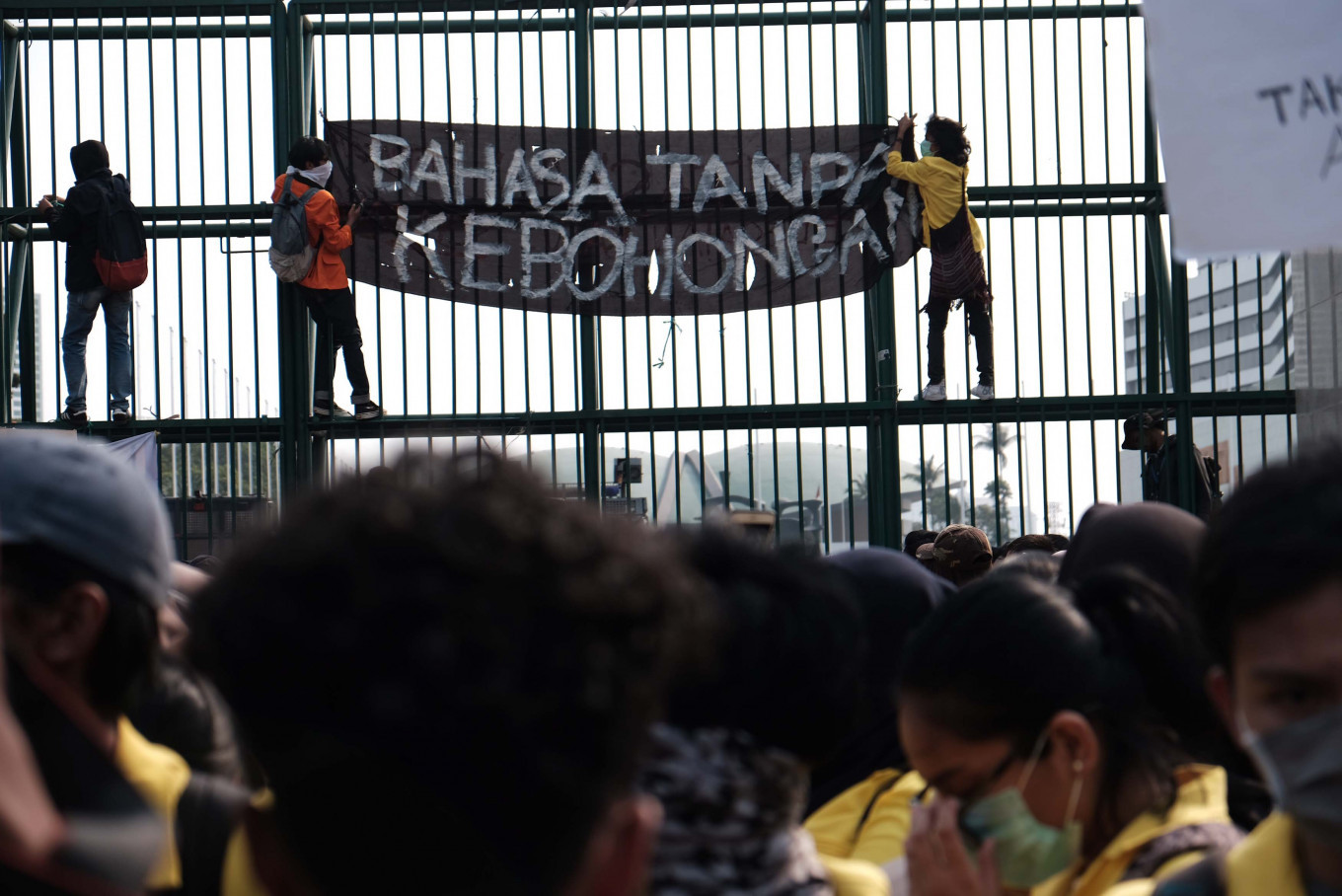Popular Reads
Top Results
Can't find what you're looking for?
View all search resultsPopular Reads
Top Results
Can't find what you're looking for?
View all search resultsCalls grow for release of KUHP draft bill
Activists accuse government of trying to skirt public scrutiny.
Change text size
Gift Premium Articles
to Anyone
A
coalition of students and civil groups has demanded that the government release the complete draft revision of the Criminal Code, which they say is being rushed for passage out of the public eye in a move that echoes a series of recent legislative efforts.
Some 80 civil groups and student organizations signed an open letter to President Joko "Jokowi" Widodo on Thursday demanding that the latest draft bill be made publicly accessible before its planned passage in a House of Representatives plenary session next month. A similar letter has been sent to lawmakers.
"Apart from opening public access to the draft bill, we also demand [that policymakers allow meaningful] public participation that is not a mere formality,” said Citra Referandum of the Jakarta Legal Aid Institute (LBH Jakarta), which forms part of the coalition.
“There should be enough time for us to discuss it together,” she said, noting that the bill, which would replace Indonesia’s colonial-era Criminal Code, would directly affect nearly everyone in the country.
She accused the government of trying to skirt public scrutiny by withholding the revisions.
The government and lawmakers say they have been seeking to soften some provisions in the bill in response to public outcry. In a meeting with House Commission III overseeing legal affairs late last month, Deputy Law and Human Rights Minister Edward OS Hiariej said the government had either reformulated or removed 14 problematic topics in the bill following what he described as a series of public consultations last year. This was less than the 24 topics that the coalition had demanded be reviewed.
Read also: Policymakers try to soften draconian provisions in Criminal Code bill
One provision under discussion would make insulting a sitting president punishable by imprisonment. Similar provisions were repealed by the Constitutional Court in 2006 on the grounds that they undermined the right to free speech.
The government claims the current provisions are different, as they allow only the offended party – in this case, the president – to file a report against the offender with the police. But critics say it could still present significant challenges for free speech.
Commission III approved the proposed changes to the 14 topics at the same meeting last month, with the majority of factions agreeing to bring the bill to a House plenary session in July to be passed into law.
Only the NasDem Party objected, demanding that each change to the bill be subject to deliberation before it was brought to the plenary session. This was rejected by other lawmakers.
"From the conclusion of the meeting, Commission III will send a letter to the House leadership to continue the lawmaking process to the next stage," NasDem lawmaker Taufik Basari told The Jakarta Post on Friday.
Protests, round two
The lack of transparency surrounding the bill has inspired student groups to threaten to once again to take to the streets in opposition to it. Three years ago, large-scale protests contributed to the postponement of work on the same piece of legislation.
Read also: Jokowi bows to public pressure, calls for delay in passing Criminal Code bill into law
The student groups have threatened to hold a mass demonstration in Jakarta if the government does not respond promptly to their demands that the draft be made publicly accessible and that the legislative process involve meaningful public participation.
"We will prepare to mobilize student alliances and civil society to move together," University of Indonesia (UI) student body president Bayu Satria Utomo said on Thursday, adding that the protests would extend beyond the capital.
The student groups said they would continue to monitor the work on the Criminal Code, particularly the articles they said threatened freedom and human rights.
Flawed law?
The controversial legislative processes surrounding the new Criminal Code mirror the passage of the Job Creation Law in 2020, which was declared "conditionally unconstitutional" by the Constitutional Court last year.
The jobs law used the legally unrecognized “omnibus method” to revise multiple laws at once, and the bill was deliberated and passed with minimal public participation. It also underwent multiple changes after being approved by the House.
Read also: Explainer: Jobs law ruling a constitutional compromise
Legal expert Asfinawati of the Indonesia Jentera School of Law said the Criminal Code was in danger of being held procedurally unconstitutional for the same reasons as the Job Creation Law.
"The ruling on the jobs law is only one example of rulings in which the Constitutional Court has emphasized that the lawmaking process must involve meaningful public participation," she said on Friday.










